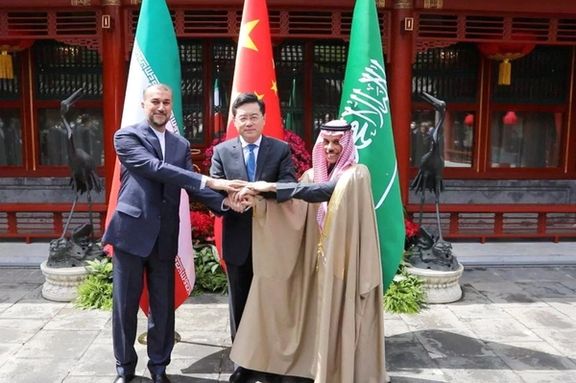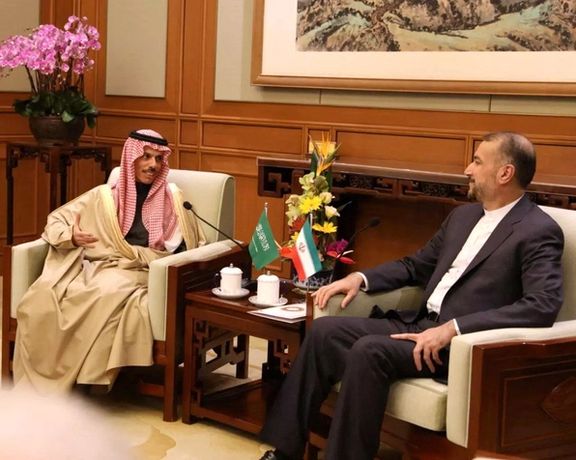Iranian, Saudi Foreign Ministers Meet In Beijing, Agree Bilateral Steps

The foreign ministers of Iran and Saudi Arabia met in Beijing for the first formal meeting in more than seven years, after a China-brokered deal to restore ties.

The foreign ministers of Iran and Saudi Arabia met in Beijing for the first formal meeting in more than seven years, after a China-brokered deal to restore ties.
Iran’s official news agency IRNA reported that a meeting of the two delegations took place and they issued a joint statement “on expanding relations and cooperation.”
Tasnim news agency affiliated with the Iran’s Revolutionary Guard reported that Foreign Minister Hossein Amir-Abdollahian and his Saudi counterpart Prince Faisal bin Farhan Al Saud discussed practical measures related to the re-opening of their embassies and consulates. They also exchanged views, Tasnim said, on “certain issues related to their bilateral relations,” without providing details.
Reuters reported that the two countries agreed to resume flights and bilateral visits of official and private sector delegations, in addition to facilitating visas for citizens, the statement said.
After years of hostility that fueled conflicts across the Middle East, Tehran and Riyadh agreed to end their diplomatic rift and re-open embassies in a major deal facilitated by China last month.
In brief footage broadcast on Iranian state TV on Thursday, bin Farhan and Amir-Abdollahian, greet each other before sitting down side by side.

In March, China's President Xi Jinping helped broker a surprise deal between regional rivals Tehran and Riyadh to end a seven-year rift and restore diplomatic ties - a display of China's growing influence in the region.
In March, Xi spoke by phone with Saudi Crown Prince Mohammed bin Salman Al Saud about several issues.
Beijing's role in the breakthrough between Tehran and Riyadh shook up dynamics in the Middle East, where the United States was for decades the main mediator.
Iran’s regime that is shunned by the West and isolated politically and under US sanctions has heralded the revival of ties with Riyadh as a significant victory and a defeat for the United States in the region.
Critics in the US have blamed the Biden Administration for pushing Saudi Arabia toward China and restoring relations with Iran, by pursuing the restoration of the 2015 nuclear deal with Tehran and losing the trust of Saudi leaders as the great power in the region.
Saudi Arabia cut ties with Iran in 2016 after its embassy in Tehran was stormed by mob of hardliners supporters of the regime during a dispute between the two countries over Riyadh's execution of a Shi'ite Muslim cleric.
The kingdom then asked Iranian diplomats to leave within 48 hours while it evacuated its embassy staff from Tehran.
The relationship began worsening a year earlier, after Saudi Arabia and the United Arab Emirates intervened in the Yemen war, where the Iran-aligned Houthi movement ousted a Saudi-backed government and took over the capital, Sanaa.
For Saudi Arabia, the deal could mean improved security. The kingdom has blamed Iran for arming the Houthis, who carried out missile and drone attacks on its cities and oil facilities.
In 2019, Riyadh blamed a massive attack on Aramco oil facilities, which knocked out half of its oil output, directly on the Islamic Republic. Tehran denied those allegations.
With reporting by Reuters